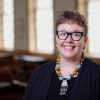This article is more than 5 years old.
On Wednesday, June 9, I participated in the “Beyond Impact Factor: Understanding & Supporting Scholarly Work in the New Academy” presentation at UNC-Chapel Hill. Sponsored by the University Libraries Scholarly Communications Committee, five speakers presented various aspects of how changes in scholarly practice and scholarship are – or are not, as is often the case – being recognized within the academy, particularly through tenure and promotion review.
Dean Gary Marchionini, School of Information and Library Science (SILS), framed the day by giving an overview of what we mean when we talk about scholarly work (creating, teaching and serving), the new academy (changes in both forms of expression and institutional structures), and impact (rewarding, attributing and assessing). As news of the University of California and Nature Publishing Group controversy had broken the evening before, participants were keenly aware of how issues that formerly had been understood as fine-grain, library-level problems are increasingly becoming big problems for scholarship. Dean Marchionini concluded by sharing an example of how SILS is trying to measure the impact of dissertation advising by faculty through the MPACT project.
Kevin Smith, Duke University’s Scholarly Communication Officer, next spoke on owning scholarship, and how new forms of scholarship are challenging ownership conventions. Mr. Smith asserted that it will most likely be these new forms of scholarship – online courses, blogging, and digital visualization projects – more so than open access that are going to push tenure reform, as the usual tools for assessing value and impact do not apply. He concluded by promoting the use of Creative Commons licenses for digital scholarship, as attribution will continue to be far more important to scholars than copyright ownership.
Erin O’Meara, UNC’s Electronic Records Archivist, then showcased the Carolina Digital Repository (CDR), UNC’s institutional repository. Under development for close to 5 years, the CDR was pre-soft launched in April. The University Libraries, SILS faculty, and interested UNC faculty have been the core collaborators on the project. One of the strengths of the CDR is the strong collaborative approach taken between technologists and curators to build the repository. Ms. O’Meara acknowledged that there are challenges ahead, some known (meeting actual needs vs. perceived needs) and some unknown, but she believes that the focus on preservation of scholarly output, born-digital special collections, and University records will provide a stable framework within which future problems can be solved successfully.
Following the first break out session, Support for New Forms of Access, I spoke on blogging as scholarship. You can read more about my thoughts in a forthcoming “Future Of” blog post, but the crux of my argument is this: blogging has changed dramatically, not only since its genesis in the late 1990’s, but even within the last five years since the Chronicle of Higher Education published an article titled, “Bloggers Need Not Apply,” and the contributions to scholarship via blogging merit recognition. Although there are problems with evaluating contributions via blogging, the rise of vetted blogging communities (ScienceBlogs) and the evolution of publications via blogs/blogging platforms (In the Library with the Lead Pipe) point to the rising value of blogs as an outlet for scholarship.
Phillip Edwards, SILS instructor, then spoke about experiences coordinating faculty awareness and support surrounding scholarly communication practices at UNC. Through two studies completed by SILS students, and one currently underway with UNC librarians, Mr. Edwards has been assessing open access awareness, open access citation effect, and open access fund application across the campus. He shared data collected through the studies in a series of tables (I’ve got a copy in my office, if anyone is interested), and posed two questions – 1. At the campus-level, how can programs and services be designed to effectively support faculty and students in their writing and publishing practices?; 2. What else might we need to know about publishing practices at UNC in order to address this question? – to launch us in to the second (and final) break out session, Support for New Forms of Scholarship.
Conversations during break out sessions were informative and enlightening, and good questions challenging the assumptions of the speakers sparked thoughtful debate. Although the audience was predominantly from UNC, including several SILS students, all four tobacco road universities were represented. I had a lot of fun returning to my alma mater to speak about a thought-provoking topic, and thoroughly enjoyed having my opinions challenged and expanded through the day’s events!

1 Comment on ‘“Beyond Impact Factor” Panel at UNC’
It sounds like it was a very interesting day. It was timely that you attended.